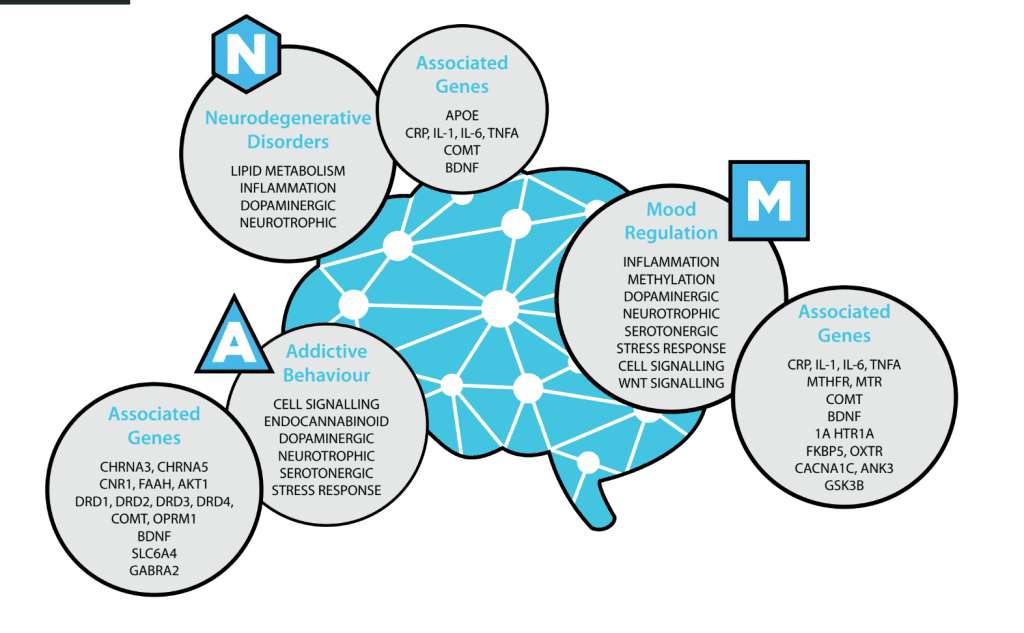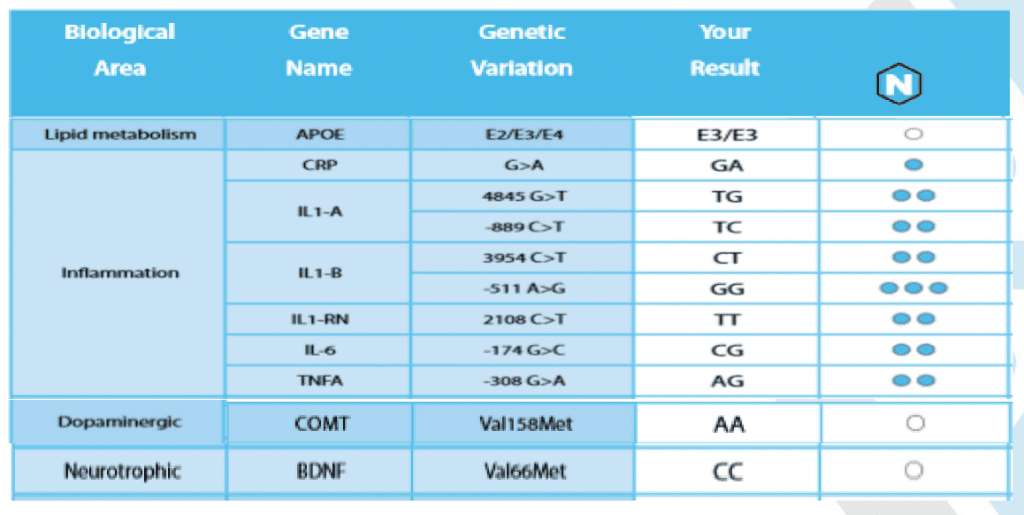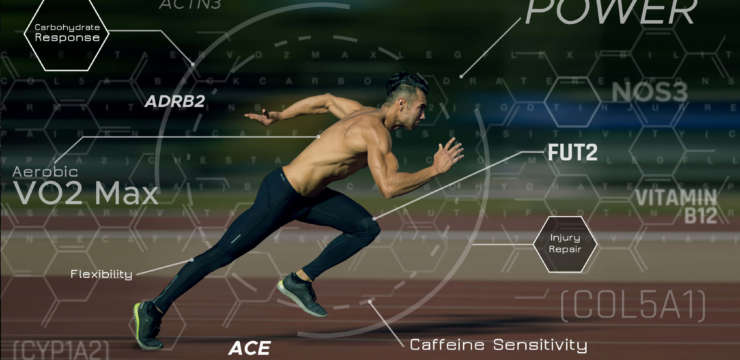
The human brain is extremely complex. Although responsible for many of our body’s capabilities, it has been known to cause extreme downfalls and disabilities if it goes awry. Neurodegenerative disorders include mild cognitive decline & late-onset Alzheimer’s disease (LOAD). By using genetic testing, we are able to assess these genes and gain biochemical insight as to how to take our patients in a direction that is best for intervention and treatment strategies. The genetic test we use is DNA Mind from DNA Life. A sample of this report can be seen below:Â
Table of Contents
GenesÂ

As noted above, the brain has many different genes pathways that are involved in specific behaviors. In Neurodegenerative disorders, we see lipid metabolism, inflammation, dopaminergic, and neurotrophic pathways all play a role. Specifically for Neurodegenerative disorders, the focus is on the specific genes below.Â

APOE
APOE is a protein in the lipid metabolism pathway. This gene is associated with the late onset of Alzheimer’s disease (LOAD). APOE supports the transports of lipids in the brain. For this specific SNP, there are two variations. ApoE2 and ApoE4. These influence the proteins structure and abilities to bind to lipids. The homozygote E2/E2 and heterozygote E2/E3 both have a beneficial impact. The wild type E3/E3 has no impact. The heterozygote E3/E4 and homozygote E4/E4 both have a high impact and the heterozygote E2/E4 has a moderate impact.Â
Individuals who have an E4 allele have an increased risk of developing Alzheimer’s. Those who have the E2 allele have protective effects against Alzheimer’s. For those who are at risk, it is key that we reduce total and saturated fat intake but ensure they are taking quality DHA and omega 3 fatty acids. The reason being that antioxidants tend to lower in those specific genotypes. For more information, please refer to GeneCards, The Human Gene DataBase.Â
CRP
CRP is a proinflammatory marker. This binds to foreign and damaged cells and increases the number of macrophages in the body. When it comes to regulation and protection, higher levels of CRP have been found in those who suffer from a psychiatric disorder like depression or dementia. The GG homozygote has a moderate impact, the GA heterozygote has a low impact, and the AA wildtype has no impact.Â
We can see here that the G allele is the risk factor. It has been linked to chronic low-grade inflammation and depressive disorder, along with cognitive decline. For individuals who have the G allele, we want to adjust their lifestyle to ensure they are taking anti-inflammatory measures. This means that we want to decrease their inflammation as much as possible by having them take omega 3 fatty acids, controlling their weight, and having steady blood glucose levels. For more information, please refer to GeneCards, The Human Gene DataBase.Â
IL-1
This is one of the first genes that becomes activated when an issue with a tissue arrises in the body. Il-1 is implicated as an important leverage point in the inflammatory cascade. We see specific genetic variations in IL-1 that can lead to a higher inflammatory response. Therefore, if you are positive for IL-1, you are at an increased risk for developing chronic diseases. IL-1 positive has a moderate impact and IL-1 negative has no impact.Â
If you are IL-1 positive results have been correlated with increased plasma concentrations and alpha beta gingival fluid. Additionally, they are associated with pro-inflammatory diseases such as neurodegenerative disease and mood disorders like depression. For more information, please refer to Gene Cards, The Human Gene DataBase.Â
IL-6Â
This incode for Interleukin 6 which is also a pro-inflammatory cytokine. This is an extremely important factor as it is responsible for the expression of CRP. We have seen that individuals with psychiatric disorders like depression and dementia have higher levels of IL-6 and CRP. Specifically, the C allele leads to increased expression and individuals with a C allele are more likely to suffer from depression and cognitive decline.Â
The wildtype GG has no impact, the GC heterozygote has a moderate impact and the homozygote CC has a high impact. Patients who possess a C allele should monitor their weight, ensuring it does not get out of hand. Excess weight leads to added toxins released throughout the body. To better control weight, we recommended staying away from pro-inflammatory foods, refined carbohydrates, and transfats. Additionally, natural supplements such as curcumin, ginger, and sulforaphane may be beneficial to these individuals. For more information, please refer to Gene Cards, The Human Gene DataBase.Â
TNFAÂ
Similar to IL-6, TNF alpha is a proinflammatory cytokine that is involved in the regulation of inflammation. We have seen that individuals who have more TNF in their blood, have depressive order and neurodegenerative disorders. In fact, those who have the A allele have a 2-fold increase in transcription, leading to increased levels circulating throughout the body.Â
The wildtype GG has no impact. The heterozygote GA has a moderate impact, and the AA homozygote has a high impact. For patients who have the risk A allele, we need to make sure they focus on reducing psychosocial stress and eat an anti-inflammatory diet. We also encourage the uptake of phytonutrient-rich foods and omega 3 fatty acids. For more information, please refer to GeneCards, The Human Gene DataBase.Â
BDNF
BDNF stands for Brain-Derived Neurotrophic Factor. This is part of the nerve growth factor family of proteins in the body. Its main purpose is to promote brain development, including neuronal cell survival, differentiation, migration, synaptogenesis, and plasticity. This gene is also hypothesized to participate in the regulation of stress in relation to neurodegenerative and mood disordered. Additionally, individuals who have altered levels are more susceptible to addictive behaviors. The wildtype CC shows no impact, the CT heterozygote shows a moderate impact, and the TT homozygote shows a high impact.Â
With these genotypes, we see the risk allele is T. When the T allele is present, there is a 25% reduction in activity-dependent secretion in the central nervous system. This is responsible for individuals having cognitive decline, anxiety, and addictive behaviors. In order to best help those who have the T allele, we recommend participating in regular aerobic exercise. Exercise has been proven to improve mood and reduce the risk of neurodegeneration. For more information, please refer to GeneCards, The Human Gene DataBase.Â
COMT
Dopamine is the neurotransmitter that is responsible for modulating feelings of reward and pleasure. If there are alterations in dopamine, we see various psychiatric disorders, neurodegenerative disorders, cognitive impairment, mood and anxiety disorders, and addictive behavior leading to risk-seeking behavior and substance abuse. COMT catalyzes the transfer of methyl groups. This is important when it comes to the metabolism of endogenous substances. The wild type, GG shows a high function impact. The heterozygote GA shows the moderate function and the homozygous AA shows low function.Â
Individuals with the GG genotype (wild type) are at a risk for developing cognitive deficits and cognitive decline. This is related to the increased enzymatic activity leading the dopamine to be broken down faster. GG genotypes also have a higher susceptibility to chase reward-seeking behaviors. It is best to encourage those with a GG genotype to engage in social activity and learning new hobbies to keep the cognitive decline to a minimum.Â
If you have the AA genotype (homozygotes) you have lower enzymatic activity. This leads to a decreased breakdown of neurotransmitters and increases your susceptibility to anxiety disorders. Additionally, the AA carriers are more likely to have bipolar disorder and depression. These individuals should avoid environmental stressors and should limit caffeine and alcohol while increasing their magnesium intake. For more information, please refer to Gene Cards, The Human Gene DataBase.Â
 Neurodegenerative disorders are extremely common and highly linked to inflammation. Inflammation is a silent killer that impacts not only the brain, but the entire body. It is important that we avoid anti-inflammatory foods and environmental factors to give our genes the optimal nutrients for expression. Additionally, regular adjustments have been proven to help individuals who have neurodegenerative disorders. Adjustments help release the pressure on the joints and realign the skeletal system. By doing so, the nervous system is able to better communicate with itself and other areas of the body. The study, “Chiropractic Management of an 81-Year-Old man with Parkinson Disease Signs and Symptoms†explains how chiropractic care significantly improved his symptoms.
Test Pairing
As noted, inflammation is an extremely common marker that has to do with neurodegenerative disorders. In order to best help the body and reduce inflammation, we do a food sensitivity test on our patients. The food sensitivity test we use is from Vibrant America. A sample report is shown below:Â
Second, we want to measure the CRP levels in an individual to get a better understanding of where this biomarker is at. The test we use is from Genova. A sample test can be shown below:Â
Neurodegenerative disorders impact so many families. These disorders are not easy for the individual nor their loved ones. Having the ability to see what you are predisposed to and taking protective actions against these specific disorders can put off a diagnosis or increase years spent without a disease. Having the chance to make nutritional and dietary adjustments now can go a long way! -Kenna Vaughn, Senior Health CoachÂ
References:Â
Bova, J., & Sergent, A. (2014). Chiropractic management of an 81-year-old man with Parkinson disease signs and symptoms. Journal of chiropractic medicine, 13(2), 116–120. doi.org/10.1016/j.jcm.2014.06.002
The scope of our information is limited to chiropractic, musculoskeletal, physical medicines, wellness, and sensitive health issues and/or functional medicine articles, topics, and discussions. We also use functional health & wellness protocols to treat and support care for injuries or disorders of the musculoskeletal system. Our posts, topics, and subject cover clinical matters, issues, and topics that relate and support directly or indirectly our clinical scope of practice.* Our office has made a reasonable attempt to provide supportive citations and has identified the relevant research study or studies supporting our posts. We also make copies of supporting research studies available to the board and or the public upon request. To further discuss the subject matter above, please feel free to ask Dr. Alex Jimenez or contact us at 915-850-0900. The provider(s) Licensed in Texas& New MexicoÂ
Disclaimers
Professional Scope of Practice *
The information herein on "DNA Mind: Neurodegenerative Disease" is not intended to replace a one-on-one relationship with a qualified health care professional or licensed physician and is not medical advice. We encourage you to make healthcare decisions based on your research and partnership with a qualified healthcare professional.
Blog Information & Scope Discussions
Welcome to El Paso's wellness blog, where Dr. Alex Jimenez, DC, FNP-C, a board-certified Family Practice Nurse Practitioner (FNP-C) and Chiropractor (DC), presents insights on how our team is dedicated to holistic healing and personalized care. Our practice aligns with evidence-based treatment protocols inspired by integrative medicine principles, similar to those found on dralexjimenez.com, focusing on restoring health naturally for patients of all ages.
Our areas of chiropractic practice include Wellness & Nutrition, Chronic Pain, Personal Injury, Auto Accident Care, Work Injuries, Back Injury, Low Back Pain, Neck Pain, Migraine Headaches, Sports Injuries, Severe Sciatica, Scoliosis, Complex Herniated Discs, Fibromyalgia, Chronic Pain, Complex Injuries, Stress Management, Functional Medicine Treatments, and in-scope care protocols.
Our information scope is limited to chiropractic, musculoskeletal, physical medicine, wellness, contributing etiological viscerosomatic disturbances within clinical presentations, associated somato-visceral reflex clinical dynamics, subluxation complexes, sensitive health issues, and functional medicine articles, topics, and discussions.
We provide and present clinical collaboration with specialists from various disciplines. Each specialist is governed by their professional scope of practice and their jurisdiction of licensure. We use functional health & wellness protocols to treat and support care for the injuries or disorders of the musculoskeletal system.
Our videos, posts, topics, subjects, and insights cover clinical matters, issues, and topics that relate to and directly or indirectly support our clinical scope of practice.*
Our office has reasonably attempted to provide supportive citations and has identified the relevant research studies or studies supporting our posts. We provide copies of supporting research studies available to regulatory boards and the public upon request.
We understand that we cover matters that require an additional explanation of how they may assist in a particular care plan or treatment protocol; therefore, to discuss the subject matter above further, please feel free to ask Dr. Alex Jimenez, DC, APRN, FNP-BC, or contact us at 915-850-0900.
We are here to help you and your family.
Blessings
Dr. Alex Jimenez DC, MSACP, APRN, FNP-BC*, CCST, IFMCP, CFMP, ATN
email: coach@elpasofunctionalmedicine.com
Licensed as a Doctor of Chiropractic (DC) in Texas & New Mexico*
Texas DC License # TX5807
New Mexico DC License # NM-DC2182
Licensed as a Registered Nurse (RN*) in Texas & Multistate
Texas RN License # 1191402
ANCC FNP-BC: Board Certified Nurse Practitioner*
Compact Status: Multi-State License: Authorized to Practice in 40 States*
Graduate with Honors: ICHS: MSN-FNP (Family Nurse Practitioner Program)
Degree Granted. Master's in Family Practice MSN Diploma (Cum Laude)
Dr. Alex Jimenez, DC, APRN, FNP-BC*, CFMP, IFMCP, ATN, CCST
My Digital Business Card






